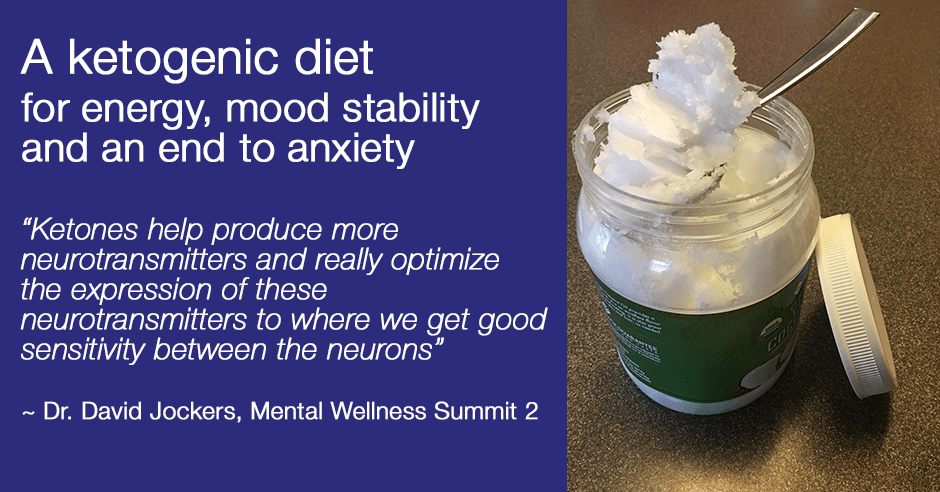
Dr. David Jockers, is interviewed on the topic of the ketogenic diet on the Mental Wellness Summit 2, which airs online September 25 – October 2, 2017. The title of his interview is “Ketogenesis for Energy Stability” but I feel it could be called “Ketogenesis for Energy, Mood Stability and an end to Anxiety.” It’s a brilliant interview and he starts by sharing how the brain can use ketones and not only sugar:
We know that about 2/3 of the brain energy can be produced by ketones. We used to think that basically the brain depended upon sugar as its only energy source. And it does need a small amount of sugar, and that’s why it’s so important we have to have a certain level of blood glucose. However, as we get keto-adapted, when we start to utilize ketones as an energy source, the brain gets much more effective and efficient, and it needs less of the sugar.
And that’s important because sugar produces a lot more metabolic waste. And so when the brain is using ketones, there is going to be less free radical damage and what we call oxidative stress in the brain, so less damage being associated with the various neurons in the brain therefore better connection, better communication.
He shares that ketones are epigenetic influencers and improve neuron sensitivity thereby improving neurotransmitter production:
Ketones act to induce healthy genetic expression. They’re epigenetic influencers where they actually influence the brain to promote more BDNF (brain derived neurotrophic growth factor), which helps grow more neurons and more synapses (little gaps between the neurons). They help produce more neurotransmitters and really optimize the expression of these neurotransmitters to where we get good sensitivity between the neurons.
So when the neurons secrete serotonin, the next neuron is able to actually connect with that very easily and realize “hey, this is the message that we need to get across.”
Dr. Jockers then goes into the relationship between GABA and glutamate and how the ketogenic diet improves the ability of glutamate converting into GABA:
There is a relationship between glutamate, which is an excitatory neurotransmitter in the brain, and GABA, which is an inhibitory neurotransmitter. Glutamate naturally converts into GABA when certain nutrients are present – like magnesium and vitamin B6 – along with a properly working GAD enzyme.
Now, when we have ketones present, they have been shown to improve the ability to convert glutamate into GABA.
Individuals with anxiety or obsessive compulsive [disorder] often have excessive amounts of glutamate, which can cause too much excitation in the brain and something called excitotoxicity that damages a whole bunch of different neurons, and causes massive neuronal death in parts of the brain. It can lead to symptoms like anxiety, headaches, migraines and seizures. The ketogenic diet has been shown in many studies to be a very powerful remedy for seizure disorders like epilepsy. That’s where this neuropharmacology of the ketogenic diet was analyzed in detail where they came up with the understanding that it impacts this glutamate to GABA conversion.
When we have adequate amounts of GABA and this proper relationship of glutamate to GABA, we feel very emotionally balanced and calm. We are able to fall asleep well. We have less pain in our body, and less susceptibility to headaches. In general, we just feel very emotionally balanced, and that’s what we’re going for.
Ketones are a huge help when it comes to that. When you’re in a state of ketosis, your natural feeling should be that you just feel awesome. You feel like a high performer. You feel at peace and you feel calm. That’s a sign that you’re in ketosis. If you are on a low carb ketogenic diet but you’re noticing irritability, anxiety and headaches, you’re actually not using the ketones. Your body is not actually keto-adapted. Instead, you’re in a hypoglycemic mode where your blood sugar is too low. You’re not using the ketones, and you’re getting exitotoxicity in your brain.
He goes on to share what a ketogenic diet should look like:
Avocados, coconut oil, coconut butter, coconut flakes, coconut milk, grass-fed butter, so butter or ghee (which is clarified butter from grass-fed cows) olives, olive oil. You want at least one of those in every single meal and you want a lot of it in every single meal.
Dr. Jockers shares about how much protein to eat, what proteins to eat, what fruits and vegetables and how much to eat, how he cycles in and out of ketosis, how he uses intermittent fasting, his favorite supplements to support ketosis (magnesium threonate is one of them), his favorite adrenal adaptogens and much more.
I hope you can us join on The Mental Wellness Summit 2 summit to hear Dr. Jockers and other excellent speakers.
I know they are referring to medications but I find it quite funny that the hosts say the “magic pill” solution is not the answer. As you’ll hear in my interview, the dangers of benzodiazepines and why GABA is a more effective option for anxiety, I believe that GABA (and tryptophan and the other amino acids) are truly “magic pill” solutions that help so many seeking relief while they dig deeper for other contributing root causes and start to make dietary changes, whether it’s switching to real whole foods, quitting gluten, removing all grains or implementing a ketogenic diet.
And let us know if you’d like to learn more about the ketogenic diet.
Also let us know how the ketogenic diet has helped you.
